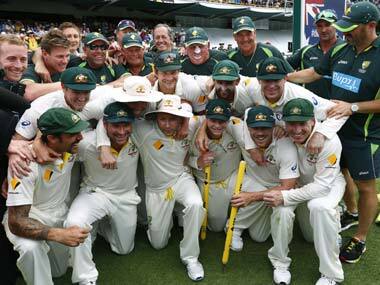Many years ago, probably during a rocky period in the mid-1990s, and after watching England struggle on a summer afternoon when we should probably both have been doing something outdoors, my father turned to me. He said: “You know, I don’t mind England losing. All I ask is that they’re competitive.” Things appeared to have mostly changed for the better once central contracts were introduced in 2000, and captains such as the hard-nosed Nasser Hussain and the tactically astute Michael Vaughan brought consistent success. Suddenly now, we seem to be back to the misery of yesteryear. A competitive Ashes series is what everyone expected when England pitched up at Brisbane in late November last year. In truth, it was hard to pick a winner at that stage. Australia were required to make some tough selection decisions, Michael Clarke was under pressure and the new coach Darren Lehmann looked a potential liability. On the other hand, England had hit some troubling bumps in the road since the summer of 2011 when beating India 4-0 at home to go no. 1 in the world. [caption id=“attachment_1323819” align=“alignleft” width=“380”]  AP[/caption] If either team had the scope to improve from the summer rubber, it seemed to be Australia, but whether they could come on enough to win back the urn was another matter. Now that the series has come to an end, we can safely agree that this was not a competitive series between what should have been two well-matched sides. We got to see a shambolic, embarrassingly careless and inept display from Alastair Cook’s England. There was such a lack of Corinthian determination, so little courage. There was no appetite for the fight, no hunger to succeed. Australia won the series 5-0, and were the two teams to play 15 more times between now and the middle of June Australia would win 20-0. I have written in these pages already about the brilliance of Mitchell Johnson, how he was kept away from the Test limelight for a while before re-appearing as a radically transformed model of his previous self with extra pace, snarl, accuracy and meanness – an old-fashioned enforcer who psychologically intimidated England. Australia were about more than Johnson, though. They had Brad Haddin too, with his century and five fifties in eight innings. Four other Australian batsmen all hit two centuries. For England there was just one individual hundred, and that from the fledgling all-rounder Ben Stokes while none of the exalted trio of Kevin Pietersen, Ian Bell and Cook himself were able to average even 30. England were rocked by the mid-tour withdrawals of Jonathan Trott and Graeme Swann, but in truth neither were achieving enough in any case. Matt Prior was abysmal. Everything these players had learned over the years was being forgotten fast. The bowlers’ lengths were all wrong, catches were being dropped. The batsmen’s shot selection was perhaps the worst aspect of all – playing rashly just before the close of play or early to the spinner, and paying the consequences. By contrast, when there was a time to be more expansive, they often became too passive, and that tentative approach was ruthlessly exploited. England’s national cricket team is an austere, insular entity where the players are sucked into a giant bubble and everything is done according to a dogmatic theory. When things are going well, that’s fine. When the wheels come off, there is nowhere to turn because nobody is prepared to listen to what people are saying and suggesting on the outside. There is no plan B. The media is viewed with intense suspicion and any potential distractions are eliminated. The players are actively discouraged from playing in the IPL and are given such a rigorous programme that they can’t spend any meaningful time with their families. On tour their life is a chain of hotels, flights and training routines. The effect of all this is that they spend too much time in each other’s company, believing they are doing the right thing, but it can’t be good for the soul. It can make the players seem arrogant, but in truth it might not be their fault. Cook is an excellent batsman who is out of form, and he is a poor tactician as a captain. There is no point in him remaining as skipper, but there is every reason for him to work hard on his batting and rejoin the ranks. Andy Flower has done many excellent things as coach but he must now leave, even though he refuses to do so. There is a viewpoint that nobody at the ECB has the authority or gumption to sack him, however, which is a very sorry state of affairs if true. In all probability, both Cook and Flower will stay on in their posts, but that seems so wrong. Well done, Australia. England are in a fine mess – but it’s not all down to you.
England’s national cricket team is an austere, insular entity where the players are sucked into a giant bubble and everything is done according to a dogmatic theory
Advertisement
End of Article


)

)
)
)
)
)
)
)
)



